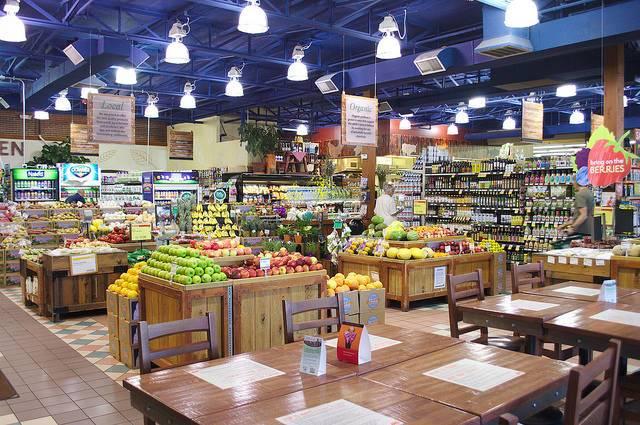
Maybe they should now start calling the world’s most famous organic non-GMO grocery chain “Half Paycheck.”
In case you missed the buzz, Amazon’s acquisition of Whole Foods officially closed earlier this week. The absorption of the 460-store chain, long derided by its critics as “Whole Paycheck,” sent other supermarket companies’ stock prices tumbling while some consumers feared this transaction could accelerate the death of brick-and-mortar retail. Others have suggested Amazon’s leap into the food business could actually be a step forward for the conscious capitalism movement.
What had become clear was that Whole Foods was perhaps a victim of its own success. The chain struggled for almost two years as it was no longer the sole purveyor of organic, sustainable, local or healthful food. Companies such as Walmart expanded their lines of organic food products, and often at prices cheaper than Whole Foods. Now Amazon threatens to completely disrupt the entire grocery industry, and the results could actually benefit consumers in several ways.
For example, Whole Foods could soon benefit from Amazon’s vast supply chain, allowing the Austin-based grocer to buy goods at even more competitive prices than in the past. And Amazon did not waste any time trying to bring more price-sensitive consumers back. Many Whole Foods store managers kept store employees late on Sunday night to roll out new co-branded signs announcing lower prices for almost two dozen products.
The move was certainly a success on many fronts as news headlines across the country generally lauded the move. But when customers were asked, the reviews were mixed. “The prices are the same so far for the things I buy,” griped one Venice shopper to the Los Angeles Times when she realized her favorite vegan products were not on that discounted products list.
Some journalists were nonplussed by the lower prices for items that included organic Gala apples, baby kale, almond butter, rotisserie chicken and bananas. The Miami Herald found that amongst 10 popular items Whole Foods decided to reduce in price, the total bill was lower than that of the popular southeastern U.S. grocer Publix – but still a couple dollars more than if the same products were purchased at Trader Joe’s. And for the poor sop whose oatmeal at the breakfast bar set him back $13 at a Whole Foods store in Washington, D.C., the hype over the new Amazon-Whole Foods marriage was also not impressive.
But Amazon is not trying to reach the consumers who forget to weigh their food before they head to the checkout line. This strategy is about Amazon pulling even more consumers into its sprawling web of services, including attracting new customers to Whole Foods (while not turning off its loyal customers who enjoy the shopping experience), believe they are buying more healthful choices and are happy paying more for what they perceive as higher-quality products.
In the meantime, Amazon is still working on the details of how and when its Prime membership will double as Whole Foods’ loyalty program. The popular Whole 365 private-label product line will reportedly soon be a prominent offer on Amazon’s Prime Pantry and Prime Now. And of course, those who do not trust that packages will remain on their doorstep after delivery will appreciate the upcoming Amazon locker service arriving at more Whole Foods locations. Such foot traffic could result in more sales for the online retailer as customers pick up a $7.99 bottle of juice to go with their box of baby wipes.
Furthermore, Whole Foods’ recent struggles could be solved by the fact that two-thirds of higher-income households do not have convenient access to Whole Foods; and for those who live paycheck to paycheck, Amazon may offer the opportunity to buy nutritious food at a fair price. Those foods could include the vegan products mentioned by that aforementioned Venice grocery shopper.
Amazon will have to be nimble, however, and show that these lower prices were not just a short-term stunt to generate headlines. A Bloomberg review, for example, found that Walmart was still overall a cheaper option than Whole Foods. Sure, Whole Foods has built its business on its stringent no-GMO, fair trade and animal welfare standards, but for households that have set a strict monthly grocery budget, Walmart will still remain their first choice. “It could be tough to persuade cost-conscious shoppers to pay $1.99 for a can of Whole Foods corn that they can get at Walmart for 68 cents,” surmised Spencer Soper and Craig Giammona of Bloomberg.
Amazon and Whole Foods have time to smooth out the wrinkles; but they need to ensure this change is convincing so it will last. Walmart will refuse to give ground in the low-price grocery wars. So far, however, this merger is off to a solid start and could help score Whole Foods the shoppers it needs to remain competitive. Chess moves by Amazon’s and Whole Foods’ competitors, as well as the risk that the companies’ cultures could clash, still pose risks, suggests Joseph Cherian, a marketing professor at the University of Notre Dame. “Overall, I'll give the launch a B+,” he concluded on CNBC.
Image credit: Tyler Cipriani/Flickr

Leon Kaye has written for 3p since 2010 and become executive editor in 2018. His previous work includes writing for the Guardian as well as other online and print publications. In addition, he's worked in sales executive roles within technology and financial research companies, as well as for a public relations firm, for which he consulted with one of the globe’s leading sustainability initiatives. Currently living in Central California, he’s traveled to 70-plus countries and has lived and worked in South Korea, the United Arab Emirates and Uruguay.
Leon’s an alum of Fresno State, the University of Maryland, Baltimore County and the University of Southern California's Marshall Business School. He enjoys traveling abroad as well as exploring California’s Central Coast and the Sierra Nevadas.














